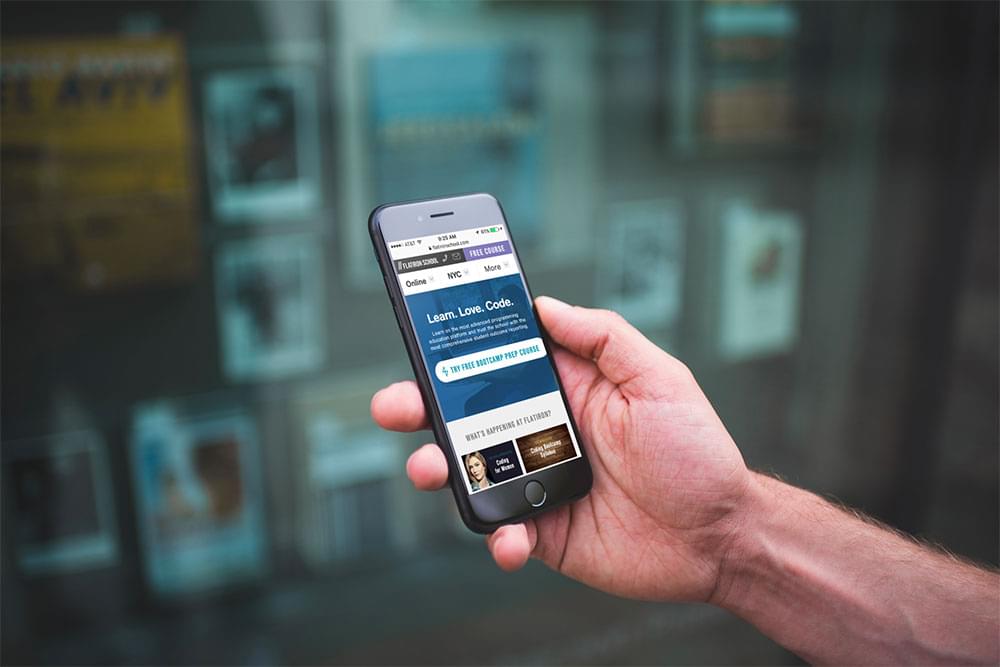
This article was sponsored by Flatiron School a coding bootcamp with courses in NYC and Online. Visit FlatironSchool.com to start a free course. Thank you for supporting the sponsors who make SitePoint possible.
So you have a non-technical role in the tech industry—maybe you’re a designer, a digital marketer, a product manager, or an entrepreneur. You’re probably used to focusing on your craft and handing off more technical tasks to developers and engineers. It makes sense—you have your expertise and they have theirs.
But as we head into an increasingly technical world, the lines between these roles are beginning to blur. Some even say that you can never truly design an efficient website unless you know how to code one.
I believe there’s a sweet spot where non-technical people can learn a little code and exercise forward-thinking, tech-friendly approaches to their work, so that when a developer takes over, he or she can work efficiently and effectively.
Let’s discuss six ways that learning to code can be hugely beneficial for your tech career, regardless of your role.
1. Communicate and Validate Your Ideas with Developers

Learning to program can teach you to communicate better—especially when it comes to communicating with developers. In this digital age, it’s almost inevitable that you’ll need to collaborate with engineers, so the more technical knowhow you have, the better you’ll be at understanding developers and their workflows. If you can credibly talk through the ins and outs of GitHub, Agile product management, test-driven development, continuous integration and deployment, you’ll be able to more effectively get on the same page and work through decisions with developer. There are plenty of free online coding courses out there that can help you get enough familiarity to communicate better with developers, including Flatiron School’s free Intro to JavaScript course.
2. Sharpen Your Problem Solving Abilities
Apart from being able to build and implement things on your own, there’s value in simply going through the process of learning a skill like coding. Programming not only strengthens your logic and problem solving abilities, but it will also change the way you see the world. Even outside of programming, you may just find yourself “debugging” other problems you encounter, from design roadblocks to writer’s block to digital marketing campaign hitches.
3. Build Better Teams
Whether you’re a freelance designer looking for a like-minded developer to collaborate with or you’re a startup founder hiring a whole team of engineers, if you want to run a successful business, you need to have a strategy for finding and hiring amazing talent. Having a technical foundation is a real asset when assessing and hiring for your projects or teams. If you’re trying to attract a potential CTO or interviewing prospective members of your technical team, showing them you’ve taken the time to learn what they do—that you can speak their language—goes a long way in attracting the best of the best. Going a step further and actually building a basic version of your product on your own also shows these potential collaborators how serious you are about your business. As Flatiron School’s co-founder Avi Flombaum says, “The more you can correctly identify tremendous talent and bring them onto your team, the better your startup and products will be.”
4. Create Ideas Holistically

A lot of people think they can get away without learning any technical skills by being “the idea guy.” But an idea—even a great one—isn’t worth much if you can’t identify and prepare for the proper steps you need to take to implement and execute on it. By learning some code, you’ll be better positioned to be able to do just that.
Let’s consider the issue of web performance. Performance is one of the most (if not the most) important aspects of web design and development, and it’s important to know how your role contributes to that even if you’re not a developer. Imagine you’re a designer planning a new homepage design or a product manager rolling out a few feature for a tech company. Visual aesthetics and intuitive user experiences mean nothing if a website doesn’t load quickly enough (between 0.5 and 2 seconds is optimal). Knowing how to code gives you a better idea of how your decisions will affect web performance so you can plan your ideas holistically, rather than in a vacuum.
5. Understand Scale Concerns for a Technical Perspective
The goal of most businesses is to scale and have an impact on users’ lives—whether that’s helping more people get around a city, like Uber, or share their homes, like Airbnb. But the downside to rapid growth, is that scaling a business invariably causes problems to arise. No matter your role in a company, when that happens, you want to be sure you’re solving the right problems at the right time and making the best use of your developers. With some programming know-how, you’ll better understand what you create—be it designs, features, processes, or infrastructure—might break down if you have the opportunity to scale your business.
6.Open the Doors for Career Flexibility
Let’s say you’re a designer looking to learn to code to deepen your abilities in your role. Maybe you want to improve your interaction design skills by understanding in-depth how those designs will be brought to life. Or perhaps you want to be well-rounded so you can make a quick fix when the front-end developers you work with are backlogged. Maybe you’re just looking to communicate better across different teams within your company.
But in learning to code, you’re also opening the doors for an exciting potential career change. You may discover that you legitimately love coding and decide to jump the fence. People dabbling with code fall in love with development and use the opportunity to change careers all the time, according to Flatiron School. Even if you’re dedicated to another pursuit, look at it from a purely practical angle: it never hurts to have lucrative skills that are in demand, especially as tech continues to find its way into—and revolutionize—more and more fields.
Conclusion
Web development is an ongoing team effort. Information and helpful tips should be flowing back and forth between you and your developers through the entire process, helping you to bond as team and improve any concepts that you may have overlooked at an earlier time.
If you’re in non-technical but want to leverage all the above advantages when working with developers, you can get your feet wet by enrolling in Flatiron School’s free online courses, including Bootcamp Prep, Intro to Javascript, and HTML & CSS: Building Responsive Websites. By learning some code, you’ll begin to understand many of your developer’s concerns — while improving the job opportunities available to you in the future.
Can you think of any more ways we can all make forward-thinking decisions that positively impact web development, improving the entire workflow at the same time?
 Josh Hirshfeld
Josh HirshfeldMarketing Copywriter, Flatiron School







